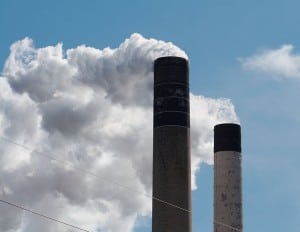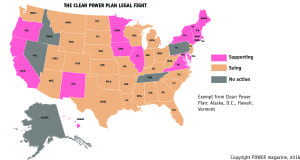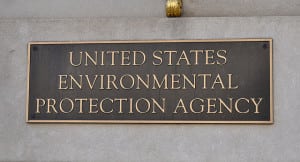Courts
-
News
EPA Urges States to Submit CCR Programs Even as Coal Ash Regulatory Overhaul Continues
The Environmental Protection Agency (EPA) on June 24 proposed to partially approve Georgia’s permit program for the disposal of coal combustion residuals (CCR). As it did so, it gave other states some advice: Follow Georgia’s lead and assume oversight of coal ash that power plants dispose within your borders. The preliminary approval marks another important […]
-
Legal & Regulatory
Energy Infrastructure on Tenuous Winning Streak in the Courts
Federal courts have been pretty kind to energy infrastructure in recent weeks, particularly in cases involving the National Environmental Policy Act (NEPA). For starters, this month, the U.S. Court of Appeals for the Ninth Circuit removed one of the hurdles to construction of the Keystone XL pipeline. The court decided that a new presidential permit—issued […]
-
News
EPA Finalizes ACE Rule, Replaces Clean Power Plan
The Environmental Protection Agency (EPA) has issued a final Affordable Clean Energy (ACE) rule to formally replace the Obama administration’s controversial Clean Power Plan (CPP). Like the CPP, the June 19–issued final ACE rule will regulate greenhouse gases (GHGs), and it will be founded firmly on the agency’s 2009 Endangerment Finding. However, the ACE rule focuses […]
-
News
Dispute Flares About Equipment at Abandoned V.C. Summer Nuclear Project
The fight about who owns equipment at the now-abandoned V.C. Summer 2 and 3 AP1000 reactors in South Carolina intensified on May 14, as key stakeholder Santee Cooper sued lead contractor Westinghouse for certification documentation related to that equipment. The lawsuit filed with the U.S. District Court for the District of South Carolina, Charleston Division, […]
-
Legal & Regulatory
A Renewed Congressional Focus on Investigating the Energy Industry
Legislative scrutiny of the energy industry have picked up of late. Here are practical steps from law firm K&L Gates that your company could take to prepare for congressional investigations.
-
News
EPA Will Issue Final Carbon Rules for Power Plants in June
The Environmental Protection Agency (EPA) plans to take final action to repeal the Clean Power Plan in June 2019, a federal court filing shows. The agency told the D.C. Circuit—in a May 6 status report—review of the Obama-era rule that sets the first carbon dioxide limits for existing power plants “continues to be a high […]
-
News
Federal Court Vacates Parts of Obama EPA’s ELG Rule
In a legal victory for environmental groups, a federal court has vacated key portions of the Environmental Protection Agency’s (EPA’s) November 2015-promulgated effluent limitations guidelines (ELGs) for steam electric power plants, deeming them “unlawful.” The decision adds a dramatic new element of uncertainty in timing of the rule, which the Trump administration has said it […]
-
News
Nuclear Subsidy Dispute Now Rests with FERC, Competitive Generators Say
The U.S. Supreme Court’s refusal to reconsider industry-led challenges to state nuclear subsidy programs in New York and Illinois leaves the contentious matter to the Federal Energy Regulatory Commission (FERC). The high court on April 15 declined to accept petitions for review of decisions by the Second Circuit and Seventh Circuit, dealing a major blow […]
-
Notebook
POWER Notebook: First Order for Novel Gas Turbine; Three Mile Island Accident Turns 40; PG&E Pushes Back on Judge’s Proposal
Siemens, Three Mile Island, and Pacific Gas and Electric (PG&E) made notable headlines over recent days. Here is this week’s POWER notebook. Siemens Bags First Order for 41-MW Aeroderivative Gas Unit Siemens on March 25 said it received its first order for its newest aeroderivative gas turbine offering—the SGT-A45. The buyer, Bayat Power, a subsidiary […]
-
Commentary
Should a Power Company Be Held Responsible for Wildfires?
If you’ve been following the news, you know that Pacific Gas and Electric Co. (PG&E) recently filed for Chapter 11 bankruptcy protection because it is facing tens of billions of dollars in liability for
-
News
Colstrip Power Plant Threatened by Westmoreland Bankruptcy
The Colstrip Power Plant, a four-unit, 2,094-MW coal-fired station located about 100 miles east of Billings, Montana, could see its coal supply contract nullified as a result of Westmoreland Coal Co.’s Chapter 11 bankruptcy reorganization. Westmoreland operates the 25,000-acre Rosebud coal mine, among others. Rosebud is adjacent to the Colstrip plant and supplies almost all […]
-
News
PG&E: Judge’s Proposal Could Cost Utility $150 Billion
Pacific Gas & Electric (PG&E) on Jan. 23 said a federal judge’s proposal that the utility mitigate fire danger in its service territory by trimming trees, along with inspecting and repairing thousands of miles of power lines, could cost the company as much as $150 billion this year. William Alsup, a judge in the U.S. […]
-
News
Clean Air Act Issues Congress Could Grapple With in New Session
While the Republican-led U.S. House and Senate in the 115th Congress was mainly focused on reviewing, for modification or repeal, several environmental rules issued under the Clean Air Act (CAA), the new Democrat majority in the House could focus on a slew of different measures, a new report from the Congressional Research Service (CRS) suggests. […]
-
News
EPA: Mercury Rules for Coal, Oil Power Units Not ‘Appropriate and Necessary’
Because compliance costs to coal- and oil-fired power plants for the Mercury and Air Toxics Standards (MATS) far exceed quantifiable benefits to regulating hazardous air pollutant (HAP) emissions, the Trump administration has proposed it is not “appropriate and necessary” to regulate HAP emissions from power plants under Section 112 of the Clean Air Act (CAA), […]
-
News
Contamination Found in Water Near Illinois Coal Ash Dumps
Analysis based on testing mostly conducted by energy companies shows that water near all but two coal plants in Illinois is contaminated with toxic waste. The Chicago Tribune on November 28 reported that a compilation of industry-supplied data from 24 Illinois coal plants shows harmful levels of arsenic, chromium, lead, and other heavy metals in […]
-
Renewables
POWER Digest [November 2018]
Ørsted Snaps Up Deepwater Wind in Major U.S. Offshore Wind Deal. Danish offshore wind farm developer Ørsted in October entered into an agreement with U.S.-based D.E. Shaw Group to buy a 100% equity interest
-
Coal
More Losses for FirstEnergy; FES Seeks Policy Support Amid Bankruptcy
Despite significant milestones to become a fully regulated utility, FirstEnergy Corp. on October 25 reported third-quarter losses of $512 million on revenue of $3.1 billion. The results largely reflect charges related to the court-approved settlement in the bankruptcy cases of its competitive subsidiaries FirstEnergy Solutions (FES) and FirstEnergy Nuclear Operating Co. (FENOC), the company said. […]
-
Legal & Regulatory
Competitive Generators Look to the Supreme Court After Seventh Circuit Declines Rehearing on Nuclear Subsidies
The Seventh Circuit Court of Appeals has declined to rehear a case that challenges nuclear subsidies in Illinois, effectively dealing a blow to a group of competitive generators, which have fought the measure for several years. In an order issued on October 9, the appellate court said its full judicial panel had voted to deny […]
-
Legal & Regulatory
EPA Advances Proposed Changes to Mercury Rule
The Environmental Protection Agency (EPA) confirmed it has submitted proposed changes to the Mercury and Air Toxics Standards (MATS) to the White House for review, despite urging by the industry to let the rule stand. EPA spokesperson John Konkus told POWERon October 2 that the agency does not intend to withdraw the existing MATS. It […]
-
Legal & Regulatory
New York Gas Plant Comes Online Despite Opposition
The Valley Energy Center in Orange County, New York, entered commercial operation on October 1 despite complaints from local officials and area residents about noise from the plant, among other concerns. Community members spoke out against the plant at public hearings last week, saying they have felt sick when the plant has undergone test runs […]
-
Legal & Regulatory
Can Coal and Nuclear Power Plants Be Saved?
It’s no secret that U.S. nuclear and coal-fired power plants are struggling to remain viable in competitive markets. Many plants have been retired for economic reasons long before the facilities reached the
-
Legal & Regulatory
Federal Appeals Court Upholds New York’s Nuclear Subsidies
New York’s subsidies of nuclear power are legally sound, the U.S. Court of Appeals for the Second Circuit has concluded. The decision comes two weeks after the Seventh Circuit upheld a similar measure in Illinois. The development marks a victory for the nuclear industry, which has been financially crippled by the rise of cheap gas […]
-
Legal & Regulatory
Appeals Court Backs Illinois’ Nuclear Subsidies
The U.S. Court of Appeals for the Seventh Circuit on September 13 upheld subsidies offered by Illinois to help struggling nuclear power plants. The court rejected arguments from power producers and some Illinois energy consumers that so-called zero-emission credits (ZEC) are preempted by the Federal Power Act. Opponents argued the program violates the Commerce Clause […]
-
Legal & Regulatory
Lawsuits Raise Stakes on Vogtle Nuclear Expansion Vote
As a vote by owners on the fate of the Vogtle nuclear expansion project hangs in the balance, the City of Jacksonville, Florida, and JEA—the city’s municipal utility that serves about 458,000 electric customers—filed a complaint in the Fourth Judicial Circuit Court of Florida on September 11 asking for declaratory judgment on a power purchase […]
-
Legal & Regulatory
Several States Urge Federal Court to Rule on Clean Power Plan
Seventeen states have asked the U.S. Court of Appeals for the D.C. Circuit to reject the Trump administration’s efforts to further delay the court’s decision on legal challenges to the Clean Power Plan. In a filing with the court on September 4, the attorneys general of California, Connecticut, Delaware, Hawaii, Illinois, Iowa, Maine, Maryland, Massachusetts, Minnesota, […]
-
Legal & Regulatory
A Brief History of the Clean Power Plan (VIDEO)
The Environmental Protection Agency (EPA) released a proposed rule to replace the Clean Power Plan—a rule regulating greenhouse gas emissions (GHG) from existing coal-fired power plants. The new “Affordable Clean Energy” rule sets GHG guidelines for states to set standards for performance for existing coal-fired power plants. The proposal is the newest development in a […]
-
Legal & Regulatory
Judge Rules New York Gas Plant Can Resume Startup Tests
A New York Supreme Court judge on August 15 said Competitive Power Ventures (CPV) can resume startup tests at its new natural gas-fired power plant in Wawayanda. The decision Wednesday from Judge Roger D. McDonough came one day after CPV sued New York’s Department of Environmental Conservation (DEC). CPV is seeking an injunction allowing it […]
-
Legal & Regulatory
EPA Will Not Revisit Obama-Era NAAQS for Ozone
The Environmental Protection Agency (EPA) does not intend to revisit national ambient air quality standards (NAAQS) for ozone that the Obama administration issued in 2015, a court filing shows. The agency said in its final status report submitted to the U.S. Court of Appeals for the D.C. Circuit on August 1 that it has reviewed […]
-
Press Releases
U.S. Water Plans to Appeal Recent Ruling That pHytOUT® Patents Are Invalid
St. Michael, MN (June 2018) – U.S. Water announces that on May 25, 2018, the United States District Court for the Western District of Wisconsin overturned a decision by a unanimous Federal Court jury that U.S. Patent Nos. 8,415,137 and 8,609,399 relating to U.S. Water’s pHytOUT® deposit control technology were valid. U.S. Water plans to […]
-
Legal & Regulatory
DOJ, FERC Back Illinois in Nuclear Subsidy Fight
The U.S. Department of Justice (DOJ) and the Federal Energy Regulatory Commission (FERC) on May 29 told the U.S. 7th Circuit Court of Appeals that Illinois’ nuclear subsidy program does not preempt federal statute, siding with the state and Exelon Corp. in a contentious legal fight that has divided the power sector. The case, now […]

























